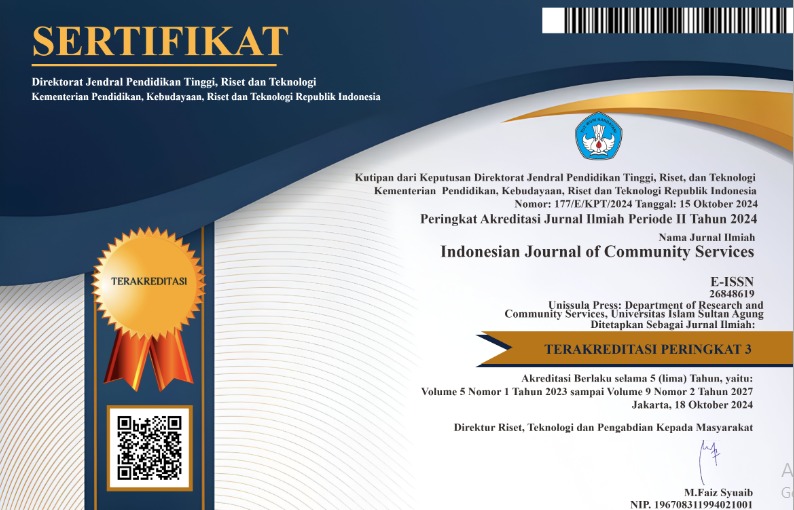Brain Gym sebagai Upaya Prompt Treatment Demensia pada Lansia di Panti Werdha Pucang Gading Semarang
Abstract
Panti Werdha Pucang Gading Semarang, di bawah naungan dari dinas sosial merupakan tempat pelayanan bagi lanjut usia yang terlantar. Panti ini dihuni oleh sekitar 100 Lansia yang berasal dari berbagai daerah di Jawa Tengah. Berdasarkan hasil pengkajian terhadap 30 Lansia yang ada di Bangsal Cempaka dengan menggunakan lembar kuesioner SPMSQ (Short Portable Status Mental Questionnaire) didapatkan hasil sebanyak 12 Lansia mengalami gangguan fungsi kognitif dengan kriteria ringan, 10 Lansia mengalami gangguan fungsi kognitif sedang dan 8 Lansia mengalami gangguan fungsi kognitif berat. Gangguan fungsi kognitif merupakan awal gejala demensia. Meskipun demensia tidak bisa disembuhkan namun dengan menjaga otak tetap aktif dapat menunda atau mengurangi efek awal demensia dan memperpanjang kemandirian. Solusi yang ditawarkan yaitu dengan melakukan brain gym sebagai upaya prompt treatment. Hasil kegiatan PKM menunjukkan setelah dilakukan brain gym pada kategori kerusakan ringan mengalami peningkatan dari 12 Lansia menjadi 17 Lansia (meningkat sebanyak 3%). Pada kategori kerusakan sedang dan berat mengalami penurunan, dari 10 Lansia menjadi 8 Lansia (menurun 9%), dan dari 8 Lansia menjadi 5 Lansia (menurun 8%). Kesimpulannya brain gym dinilai efektif sebagai upaya prompt treatment untuk meningkatkan fungsi kognitif pada Lansia yang mengalami demensia.
Pucang Gading Semarang Nursing Home, under the auspices of the social service, is a service center for neglected elderly people. This nursing home is inhabited by around 100 elderly people from various regions in Central Java. Based on the results of a study of 30 elderly people in the Cempaka Ward using the SPMSQ (Short Portable Status Mental Questionnaire) questionnaire, it was found that 12 elderly people experienced mild cognitive dysfunction, 10 elderly people experienced moderate cognitive dysfunction, and 8 elderly people experienced severe cognitive dysfunction. Cognitive dysfunction is an early symptom of dementia. Although dementia cannot be cured, keeping the brain active can delay or reduce the early effects of dementia and prolong independence. The solution offered is to conduct brain gym as a prompt treatment effort. The results of this activity showed an increase in cognitive function in the elderly after brain gym was conducted. In conclusion, brain gym is considered effective as a prompt treatment effort to improve cognitive function in the elderly with dementia.
Keywords
Full Text:
PDFReferences
Afandi, A., Laily, N., Wahyudi, N., & Umam, N. . (2018). Metodologi Pengabdian Masyarakat. In Analytical Biochemistry (Vol. 11, Issue 1). https://link.springer.com/10.1007/978-3-319-59379-1%0Ahttps://dx.doi.org/10.1016/B978-0-12-420070-8.00002-7%0Ahttps://dx.doi.org/10.1016/j.ab.2015.03.024%0Ahttps://doi.org/10.1080/07352689.2018.1441103%0Ahttps://www.chile.bmw-motorrad.cl/sync/showroom/lam/es/
Afconneri, Y., Herawati, N., & Deswita, D. (2024). Faktor-Faktor Yang Mempengaruhi Risiko Demensia Pada Lansia. Jurnal Keperawatan Jiwa (JKJ), 12(1), 177–186.
Aggarwal, H., Chaware, S., & Aggarwal, H. (2022). A Critical Study on the Impact of Dementia on Older People Undergoing Treatment in Care Homes. Cureus, 14(10). https://doi.org/10.7759/cureus.30056
Bhatti, G. K., Reddy, A. P., Reddy, P. H., & Bhatti, J. S. (2020). Lifestyle Modifications and Nutritional Interventions in Aging-Associated Cognitive Decline and Alzheimer’s Disease. Frontiers in Aging Neuroscience, 11(January), 1–15. https://doi.org/10.3389/fnagi.2019.00369
Falck, R. S., Davis, J. C., Best, J. R., Crockett, R. A., & Liu-Ambrose, T. (2019). Impact of exercise training on physical and cognitive function among older adults: a systematic review and meta-analysis. Neurobiology of Aging, 79, 119–130. https://doi.org/10.1016/j.neurobiolaging.2019.03.007
Hatmanti, N. M., & Yunita, A. (2019). Senam Lansia dan Terapi Puzzle terhadap Demensia pada Lansia. Jurnal Keperawatan Muhammadiyah, 4(1), 104–107. https://doi.org/10.30651/jkm.v4i1.2422
Hugo, J. (2014). Dementia and Cognitive Impairment: Epidemiology, Diagnosis, and Treatment. Clinics in Geriatric MEdicine, 30(3), 421–442. https://doi.org/10.1016/j.cger.2014.04.001.Dementia
Husmiati, H. (2016). Demensia Pada Lanjut Usia Dan Intervensi Sosial. Sosio Informa, 2(3), 229–238. https://doi.org/10.33007/inf.v2i3.839
Janaris, S. F., Gondodiputro, S., & Arisanti, N. (2020). Risk Factors of Dementia in Elderly of Bandung City, Indonesia: A Community-Dwelling Study. Althea Medical Journal, 7(4), 216–222. https://doi.org/10.15850/amj.v7n4.2150
Lukas, A., Setyopranoto, I., Sakit Awal Bros Panam, R., Neurologi, B., & Kedokteran Universitas Gadjah Mada, F. (2020). Korelasi antara ansietas, depresi, dan gangguan kognitif terhadap kualitas hidup penderita penyakit Parkinson. Berkala NeuroSains, 17(3), 133–141.
Nurlan, N., & Eny, K. (2021). Hubungan Demensia Dengan Tingkat Kemandirian Activity Of Daily Living (ADL) Pada Lansia Di RT.04 RW.11 Jati Bening Pondok Gede Bekasi. Afiat, 7(2), 81–95. https://doi.org/10.34005/afiat.v7i2.2138
Ramos-Galarza, C., Aymacaña-Villacreses, C., & Cruz-Cárdenas, J. (2023). The intervention of Brain gym in the mathematical abilities of high-school students: A pilot study. Frontiers in Psychology, 13(January), 1–11. https://doi.org/10.3389/fpsyg.2022.1045567
Sabri, R., Indriani, Z., & Mahathir. (2023). Application Of Brain gym Exercise to Improve Cognitive Function of Elderly at Risk of Dementia in Nursing Home West Sumatera: Case Report. Juniper Online Journal of Case Studies, 14(3), 1–4. https://doi.org/10.19080/jojcs.2023.14.555887
Sari, M., Tarigan, D. P., & Rafiyah, I. (2022). Hubungan tingkat pendidikan dengan status demensia pada Lansia berdasarkan kajian data sekunder di Posbindu Caringin. Jurnal Keperawatan Muhammadiyah, 7(2), 162–170. https://journal.um-surabaya.ac.id/index.php/JKM/article/view/12380
Sommerlad, A., Kivimäki, M., Larson, E. B., Röhr, S., Shirai, K., Singh-Manoux, A., & Livingston, G. (2023). Social participation and risk of developing dementia. Nature Aging, 3(5), 532–545. https://doi.org/10.1038/s43587-023-00387-0
Sopyanti, Y. D., Sari, C. W. M., & Sumarni, N. (2019). Gambaran Status Demensia Dan Depresi Pada Lansia Di Wilayah Kerja Puskesmas Guntur Kelurahan Sukamentri Garut. Jurnal Keperawatan Komprehensif (Comprehensive Nursing Journal), 5(1), 26–38. https://doi.org/10.33755/jkk.v5i1.125
Vaishnavi, V. ., Waqar, M. ., & Chaitanya, A. . (2020). Importance of Brain gym as exercise in physiotherapy and rehabilitation. International Journal of Research in Pharmaceutical Sciences, 11, 1386–1389.
Varela, S., Ayán, C., Bidaurrazaga-Letona, I., Diz, J. C., & Duñabeitia, I. (2023). The effect of Brain gym on cognitive function in older people: A systematic review and meta-analysis. Geriatric Nursing, 53, 175–180. https://doi.org/10.1016/j.gerinurse.2023.07.015
Wang, Y., Xu, H., Geng, Z., Geng, G., & Zhang, F. (2023). Dementia and the history of disease in older adults in community. BMC Public Health, 23(1), 1–11. https://doi.org/10.1186/s12889-023-16494-x
DOI: https://dx.doi.org/10.30659/ijocs.7.1.45-51
Refbacks
- There are currently no refbacks.
Copyright (c) 2025 Iskim Luthfa, Nopi Nur Khasanah

This work is licensed under a Creative Commons Attribution 4.0 International License.

